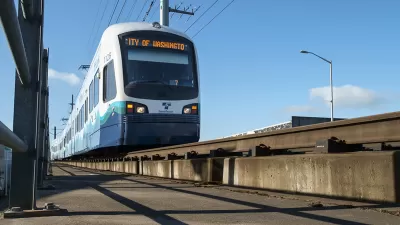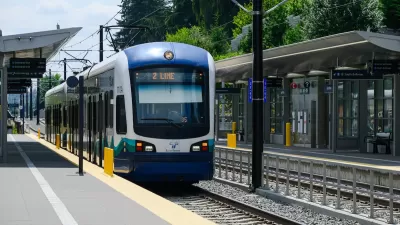Sound Transit claims maintenance work is necessary to prepare for upcoming transit extensions, but critics question the need to make drastic service cuts.

Maintenance projects planned by the Seattle area’s Sound Transit could cause major disruptions in service over the next several months. As Stephen Fesler writes in The Urbanist, “The planned service disruptions in July and in the fall will reduce Link frequencies to 20 minutes. This equates to a 53% reduction during peak periods and about 50% during off-peak periods.”
Fesler argues that while maintenance work makes sense in light of the transit extensions slated to open in the next few years, “it’s clear that the service disruptions do not need to be as severe as the agency is planning, and that raises the specter of major service disruptions for modest maintenance work becoming routine.”
Fesler lists the schedule and impacts of planned service disruptions, pushing back on some of the agency’s more questionable decisions, such as choosing to go single-track or not considering using crossover tracks to maintain service while work is occuring. According to Fesler, the announcement came without meaningful community engagement and with little explanation of the plan to the agency’s board. “Ultimately, Sound Transit’s Future Ready service disruptions are the result of agency staff deciding in favor of a blunt tool of simplicity to complete maintenance work, not one of necessity.”
FULL STORY: Sound Transit Decrees ‘Tile-mageddon’ Service Disruptions Due to Maintenance Work

Alabama: Trump Terminates Settlements for Black Communities Harmed By Raw Sewage
Trump deemed the landmark civil rights agreement “illegal DEI and environmental justice policy.”

Planetizen Federal Action Tracker
A weekly monitor of how Trump’s orders and actions are impacting planners and planning in America.

The 120 Year Old Tiny Home Villages That Sheltered San Francisco’s Earthquake Refugees
More than a century ago, San Francisco mobilized to house thousands of residents displaced by the 1906 earthquake. Could their strategy offer a model for the present?

In Both Crashes and Crime, Public Transportation is Far Safer than Driving
Contrary to popular assumptions, public transportation has far lower crash and crime rates than automobile travel. For safer communities, improve and encourage transit travel.

Report: Zoning Reforms Should Complement Nashville’s Ambitious Transit Plan
Without reform, restrictive zoning codes will limit the impact of the city’s planned transit expansion and could exclude some of the residents who depend on transit the most.

Judge Orders Release of Frozen IRA, IIJA Funding
The decision is a victory for environmental groups who charged that freezing funds for critical infrastructure and disaster response programs caused “real and irreparable harm” to communities.
Urban Design for Planners 1: Software Tools
This six-course series explores essential urban design concepts using open source software and equips planners with the tools they need to participate fully in the urban design process.
Planning for Universal Design
Learn the tools for implementing Universal Design in planning regulations.
Clanton & Associates, Inc.
Jessamine County Fiscal Court
Institute for Housing and Urban Development Studies (IHS)
City of Grandview
Harvard GSD Executive Education
Toledo-Lucas County Plan Commissions
Salt Lake City
NYU Wagner Graduate School of Public Service





























